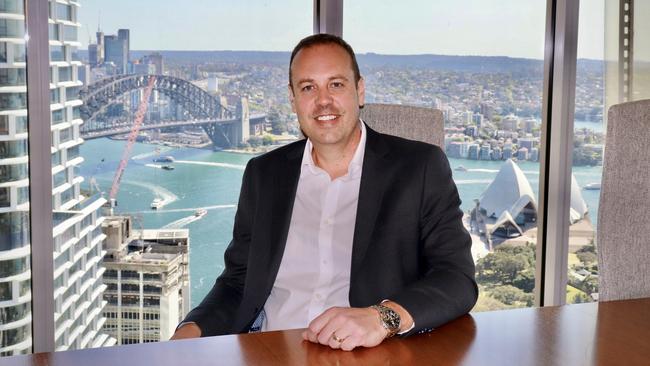The secret, lonely lives of our millionaire day traders
Broker Ryan Phillips has spent 25 years chasing the elusive creatures who drive daily volumes in financial markets. These are the rules they swear by.

Ryan Phillips has spent the last quarter of a century chasing and analysing the elusive creatures which drive daily volumes in financial markets.
The head of specialist trading platform Bell Direct Advantage, part of the listed Bell Financial Group, has devoted his career to uncovering the secret lives of day traders to deliver them the ultimate trading platform experience.
“We have a client that lives in Bendigo. I’ve met him on several occasions and he’s actually ended up paying his wife to give up work, to stay home, to be available to answer the front door, answer any phone calls that come through and to bring in his lunch so he can focus on trading,” Phillips says.
“He’s in his late 50s and he’s a client that I’ve been managing for close to 20 years. There are several examples like that.”
Unlike traditional long-term investors who hold assets for months or years, classic day traders typically close all their positions by the end of the trading day, avoiding overnight offshore risk.
Phillips calls the other four classes of day traders momentum, swing, fundamental and position or long-term traders.
The first follow stocks rising and falling in value; the second attempt to capture gains in a stock within one to seven days; the third trades off the state of a company balance sheet; and the fourth stays in stocks for weeks or even months.
They are all not to be confused with high-frequency traders, who use automated, electronic systems with complex algorithms to buy and sell fast, and at scale.

Phillips says Bell Direct Advantage has a number of clients now worth tens of millions of dollars from their day trading. Their secret, he says, is discipline.
“They don’t look to enter a position for the sake of it but because they identify a true opportunity,” he says.
“People who give up their day job to be a day trader, if the market is quiet and there’s not a lot of volume, they tend to force a trade because they need the money to feed the family. When they are forcing a trade is generally when they lose, because they are trading for the sake of it and not because they see the right opportunity.”
These multi-millionaires are extremely valuable to Bell — the top 85 will be entertained by the firm for the afternoon on a luxury superyacht on Sydney Harbour in November to say “thank you” for their service.
Downsides to success
But Phillips also says a typical — and sadder — trait of day traders is loneliness.
“They are usually sitting in a home office looking at two, three or four computer monitors, and they can’t be distracted. They don’t like taking telephone calls during the day because they could miss out on an opportunity,” he says. “I see them at times being in their pyjamas all day, very reluctant to have conversations, because they don’t want to be distracted.”
They can also lose a lot of money very quickly. Experience is paramount.
“To be successful you have to be doing it for quite a while,” he says. “There are a lot of experiences you learn from along the way. Sometimes you need to lose to identify your flaws and how to improve your trading habits.”
Phillips might have spent the past 25 years in the financial markets, yet he worked as a landscape gardener when he first left school.
His after-hours passion was playing basketball and he was good enough to represent NSW. When he was in year 11 in 1993, he secured a scholarship with Basketball Australia, which gave him the opportunity to look at playing in college leagues overseas.
“But I’m an only child, and I guess my parents weren’t that supportive of me leaving home,” he quips. It forced him to focus on a career.
But, he had no interest spending countless hours in the hot sun as a gardener long-term.
Ironically, his introduction to finance would come at the age of 22 in 1999, through basketball, which he still plays two nights a week to de-stress from looking at screens all day.
A friend who was in his team at the time and who worked in financial markets said there was a job going at the Commonwealth Bank-owned online broker CommSec for a customer service officer.

Phillips applied for the role and got it. He would spend the next two decades with the firm.
At the time he also started dabbling in technology stocks. One of his first was Sausage Software, before the dot.com bubble burst.
His big break at CommSec came in 2006, when a then rising star within CBA, Matt Comyn, now the bank’s chief executive, was appointed as chief executive of the online broking firm.
Comyn made Phillips head of retail broking, where he spent the next three years, including through the global financial crisis. He drove significant customer growth (from 5000 to 20,000 customers) and the strategic direction of the platform.
In 2009, Comyn asked Phillips to review CommSec’s high-value client desk, which led to the creation of CommSec One, which to this day looks after the high-value clients of the online broker. Phillips spent the next 10 years as executive manager of the division.
He describes Comyn as motivated and dedicated, while also being very personable.
“So, what I learned is the value of surrounding yourself with good staff. Matt always encouraged me to hire quality staff and invest in the people, so that’s something that I’ve continued to do. In fact, there are two staff members that are with me today that have been with me for the last 17 years,” Phillips says.
“I find that if you invest in staff and you do well for them and continue to develop them, then it pays off in spades.”
‘Sometimes you need to lose to identify your flaws and how to improve your trading habits’
Ryan Phillips
In 2020, Bell Financial Group chief executive Arnie Selvarajah approached Phillips with an opportunity to do it all over again, but better.
Phillips jumped at the challenge to create and build Bell Direct Advantage his way, establishing it in October 2020.
“Arnie was the first person to identify that opportunity, when we first created the desk with the first 400 clients,” Phillips says.
“We actually ran some statistics a number of years later, and it was something like 96 per cent of those clients were still active and stayed with us. It was an extraordinary number, showing the value of recognising those clients, investing in them and developing a relationship with them.”
While the platform provides a premium service to sophisticated high net worth investors, it is servicing the elusive day traders that continues to intrigue and drive Phillips most.
Bell Direct Advantage offers all the services a day trader may need. But arguably the most important is access to Phillips himself as a personalised trading manager.
Over his decades servicing high-value clients, he’s learned plenty about the investing rules day traders swear by.
Their greatest priority is speed.
“The most important thing is the priority of their orders. Placing an order as quickly as possible, to get to the front of the queue, is paramount,” he says.
Another successful rule of thumb is that clients who don’t hold positions overnight are generally the ones who don’t have big losses, because they avoid exposure to significant overseas market movements.
The most successful day traders also trade stocks based on momentum, using sophisticated stock-screening tools to identify the best bets before others.
One tool offered by Bell Direct lists stocks with unusual trading volumes, allowing a user to get a better understanding of the flow of trades in a particular stock.
“That provides a quick way to observe the market without you having to do your own research. So if you are a momentum trader, it shows you the unusual volume on the upside as well as the downside,” Phillips says.

The best day traders also stick rigidly to a set percentage buffer before they sell.
“They’ve got a set limit whereby, if they are in a stock at eight cents, they will ensure they sell that stock before it gets to 7.6 cents,” he says.
Most importantly, he says good day traders stay true to their way of trading.
“Sometimes you see clients that might have a particular style of trading, and then once they start to steer away from that or enter into a new type of product, they tend to get caught out,” Phillips says.
“The best stick to what they do well. We have seen some clients move into CFD’s (contracts for difference), but they tend to come back a month later and say it was a bad decision. So stay true to your investment methodology.”
Looking ahead
Currently he says position, or long-term traders in the market are most favouring artificial intelligence, data centre and biotech stocks, while the swing and momentum traders are buying stocks such as Clarity Pharmaceuticals and Droneshield.
The former has pioneered new forms of cancer treatment through radiopharmaceuticals, using copper to pinpoint and better treat tumours with precision. The latter is Australia’s largest publicly listed defence company.
“It is about the amount of increased buyers and volume that is going through these stocks. So if the traders see a lot of volume, they get a lot more confidence that there is a lot more activity, so therefore it drives the market up,” Phillips says. “So if you’ve got a client that wants to buy $100,000 worth of stock, for example, then they feel that once they place a buy order, they are going to get support behind them, as well as the volume to be able to exit, which is very important.”
AI is still relatively new to the day trading field, but Phillips has confidence that as brokers and third-party vendors continue to invest in their platforms and technology, they will be able to provide access to information more readily using AI.
One day he hopes a client will be able to place an order verbally rather than writing one on an order pad.
“Maybe you will be able to talk to the system to pre-populate the order pad. To talk through your methodology to a chatbot, and then have that put into practice with an order,” he says.
After four years in business, Bell Direct Advantage now has 1500 clients. Phillips says the future will be about continuing to invest in the platform to stay ahead of the pack.
“A lot of our success is based off referrals and word of mouth. We haven’t really advertised as such. So for us, it is really about making sure that the services are unique and that we provide all the tools that are not available to other online brokers,” he says.
“I liken it to the classic line from the movie Field of Dreams: ‘If you build it, they will come’.”




To join the conversation, please log in. Don't have an account? Register
Join the conversation, you are commenting as Logout